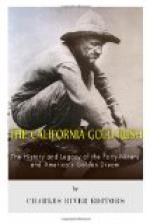The physical life was very hard, and it is no wonder that the stragglers back from the mines increased in numbers as time went on. It was a true case of survival of the fittest. Those who remained and became professional miners were the hardiest, most optimistic, and most persistent of the population. The mere physical labor was very severe. Any one not raised as a day laborer who has tried to do a hard day’s work in a new garden can understand what pick and shovel digging in the bottoms of gravel and boulder streams can mean. Add to this the fact that every man overworked himself under the pressure of excitement; that he was up to his waist in the cold water from the Sierra snows, with his head exposed at the same time to the tremendous heat of the California sun; throw in for good measure that he generally cooked for himself, and that his food was coarse and badly prepared; and that in his own mind he had no time to attend to the ordinary comforts and decencies of life. It can well be imagined that a man physically unfit must soon succumb. But those who survived seemed to thrive on these hardships.
California camps by their very quaint and whimsical names bear testimony to the overflowing good humor and high spirits of the early miners. No one took anything too seriously, not even his own success or failure. The very hardness of the life cultivated an ability to snatch joy from the smallest incident. Some of the joking was a little rough, as when some merry jester poured alcohol over a bully’s head, touched a match to it, and chased him out of camp yelling, “Man on fire—put him out!” It is evident that the time was not one for men of very refined or sensitive nature, unless they possessed at bottom the strong iron of character. The ill-balanced were swept away by the current of excitement, and fell readily into dissipation. The pleasures were rude; the life was hearty; vices unknown to their possessors came to the surface. The most significant tendency, and one that had much to do with later social and political life in California, was the leveling effect of just this hard physical labor. The man with a strong back and the most persistent spirit was the superior of the man with education but with weaker muscles. Each man, finding every other man compelled to labor, was on a social equality with the best. The usual superiority of head-workers over hand-workers disappeared. The low-grade man thus felt himself the equal, if not the superior, of any one else on earth, especially as he was generally able to put his hand on what were to him comparative riches. The pride of employment disappeared completely. It was just as honorable to be a cook or a waiter in a restaurant as to dispense the law,—where there was any. The period was brief, but while it lasted, it produced a true social democracy. Nor was there any pretense about it. The rudest miner was on a plane of perfect equality with lawyers, merchants, or professional men. Some men dressed in the very height of style, decking themselves out with all the minute care of a dandy; others were not ashamed of, nor did they object to being seen in, ragged garments. No man could be told by his dress.




